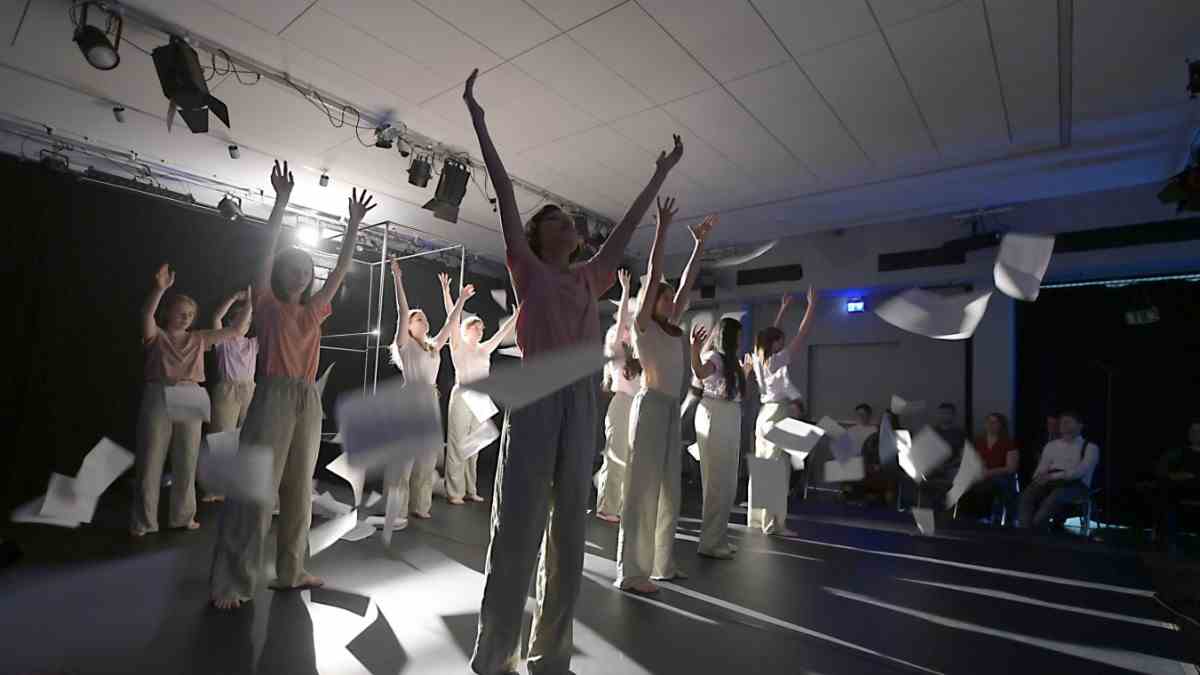“I can’t understand that people’s lives are constantly being put in danger by other people. I can never understand it and I find it appalling.” The Second World War had only just begun when Sophie Scholl expressed her dismay with these words. Around 80 years later, on Monday evening, a young student stands on the stage at the Ernst-Mach-Gymnasium in Haar, only dimly lit. A group of other actresses move around her as she raises her voice: “Sophie, I’m Nelly and it depresses me that people, even children, are dying in the Ukraine war.”
It is a drastic parallel with which the students from Haar in their theater performance “Sophie!” make it clear how frighteningly topical the story of the resistance fighter against National Socialism still is today.
There was music and short speeches in the library of the high school to welcome the premiere guests.
(Photo: Claus Schunk)
The play, which was supported by the Haar Civic Foundation and the Weisse Rose Foundation, was originally developed to mark Sophie Scholl’s 100th birthday last year, as explained by Thomas Ritter, who, as the supervisor of the theater groups at the Haarer Gymnasium, was also responsible for this together with Farina Simbeck had accompanied the multi-award-winning “Spurensuche” project, which was performed throughout Europe. Due to the pandemic, however, the performance could only premiere on Monday evening.
What kind of person was Sophie Scholl? She loved music and nature, sometimes danced stubbornly, the viewer learns. Interspersed with the historical characterization of the resistance fighter are biographical statements from the young actresses: “I’ll also study biology like you,” announces a student. Another gives insights into her emotional world, she is often sad, maybe even depressed. Her classmate talks about a boy she has a crush on.
In their play, the actresses of the same age try to make the famous icon of freedom tangible
For the young schoolgirls in particular – the actresses are between twelve and 16 years old – the events surrounding Sophie Scholl must seem like something from a different, long-gone era. And yet they manage to make the figure of the often strongly idealized icon of freedom tangible, to make it seem approachable, especially through their own personal insights. The living environment of the young people is reflected in quotations from Sophie Scholl’s diaries: it’s about insecurities, dreams for the future and first romantic feelings.
An exchange of letters between the young woman and her lover Fritz Hartnagel is read aloud, with an almost childish enthusiasm in her voice, tender and shy. These emotions may seem familiar to some of the young schoolgirls – even if communication today hardly takes place via letters.
It is above all these scenes that show how human Sophie Scholl was, says actress Annely. “Obviously what she did is really important, but she’s not just this icon.” Her classmate Sophie adds: “She was just a girl like us who was also in love.”
By his own admission, Thomas Ritter was pursuing precisely this goal: the character of Sophie Scholl was recently unnaturally exaggerated. “We didn’t want to get too caught up in that glorification, although of course it’s impressive how steadfast she was at her age.” Rather, he was concerned with making the activist tangible. According to Ritter, the fact that Scholl was only a few years older than the students at the time of her execution makes this particularly possible. “Through the confrontation with Sophie Scholl, the young people have rediscovered much more of themselves than expected.”
“It brings the events of that time so much closer to us.”
(Photo: Claus Schunk)
According to Ritter, the development of the piece was preceded by an intensive research process. The high school students studied Scholl’s diaries in detail, visited her grave and the Nazi documentation center. This approach conveyed the events in a completely different way than is usually the case in class, says Sophie, a student of the same name. “It was only then that you really realized how bad it all was.” In the documentary center, the actresses were confronted with terrible images. Annely: “There were photos of corpses lying on top of each other.”
Bad pictures are currently in the news again. The war in the Ukraine weighs on the students themselves, which is also evident in their play. Events from the Second World War are discussed in a chronicle-like presentation. “1941: Battle of Kyiv,” reads a girl. Suddenly the hasty music stops, the lights go out. A second actress steps up to the microphone: “2022: Battle for Kyiv”.
“It brings the events of that time so much closer to us,” says actress Tomma. “But with the piece we also want to show that you can do something,” adds Annely. The war affects not only adults, but also young people. “They usually don’t have much to say.” Sophie Scholl made it anyway.
More performances of “Sophie!” on May 17, 18 and 20 at 7 p.m. and on May 21 at 3 p.m. and 7 p.m. in the Ernst-Mach-Gymnasium Haar, Jagdfeldring 82. Tickets can be sent by email to [email protected] or about www.blickwechsel.theater be reserved.

